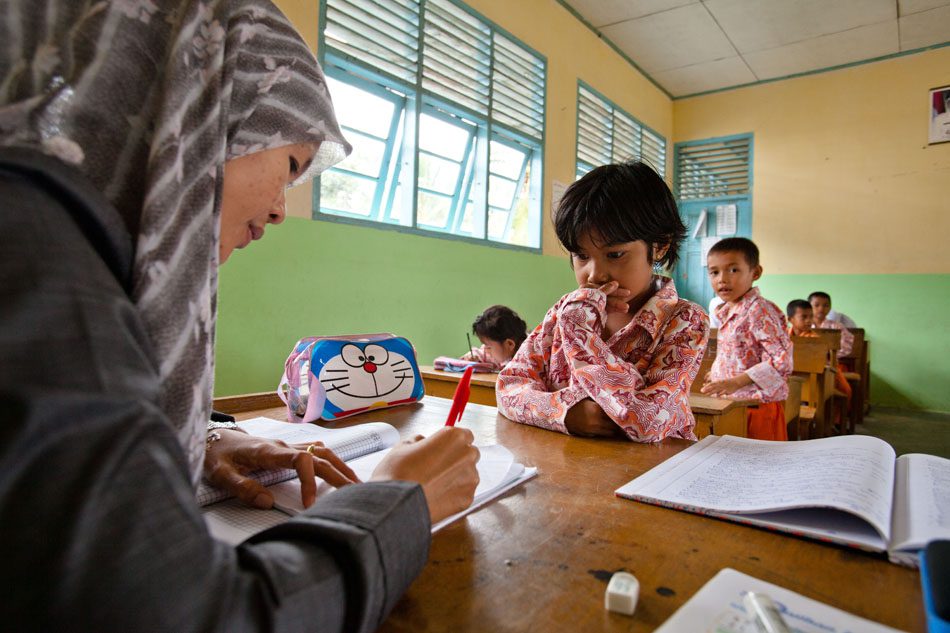As stockpiles of palm oil soar and prices slump, will Indonesia and Malaysia succeed in rejuvenating its most profitable export?
By Caroline Vernaillen
Oil palm trees were introduced to Southeast Asia only 150 years ago as decorations for the mansions of tobacco planters or as exotic marvels in botanical gardens; no one back then could have predicted the spectacular rise the tree would take.

Dammed up: Sumatran farmers work out the irrigation system for their community oil palm plantation
It took 50 years for one of the original planters to notice how well the native African crop thrived in the Southeast Asian climate and another 50 for an industry to develop.
Today, palm oil plantations account for 13 million hectares of farmland in Indonesia and Malaysia, an area roughly the size of England. Indeed, palm oil has proven to be an extremely lucrative business, earning Malaysia a record-breaking $26 billion in 2011. But the increasing dependency of these countries on the palm oil industry carries with it great risks.
According to the United States Department of Agriculture, Indonesia and Malaysia together account for 87% of the world’s palm oil production and 89% of the world’s exports. This ascendancy is no small achievement, considering the enormous popularity of the saffron coloured oil: palm oil makes up one-third of the world’s vegetable oil production and two-thirds of its exports. Its use is incredibly versatile: A 2008 study by AC Nielsen showed that of the 100 most purchased products in the United Kingdom, 43 contained palm oil, ranging from food, to cosmetics and detergents. On top of that, palm oil is increasingly sought-after as a biofuel.
“Palm oil is highly energy efficient,” said Fadhil Hasan, executive director of the Indonesian palm oil association, GAPKI. Oil palms produce six times more oil per unit area than its closest contender, rapeseed. Compared to soybeans with the same input energy, palm oil produces an output energy three times as high.
But not all is rosy for the business. “The challenges ahead for the industry are many and big,” Hasan said.
Plagued by environmental and human rights criticisms since its birth, the industry is now increasingly experiencing economic pressures. In 2012, palm oil prices declined by 25%, reaching a three-year low in October. Demands from the European Union and China slowed and record stockpiles were registered in Indonesia and Malaysia.
“We don’t see a short-term solution for this,” said Hasan. “Right now, mills that process crude palm oil have a maximum storage capacity of a month. We propose that they increase that to two months. Another solution is to increase the domestic demand for biofuel.”
In the meantime, Indonesia and Malaysia have entered into an export war, racing their taxes to the bottom. Malaysia announced that from the beginning of 2013 it would lower its 23% export duty on crude palm oil to anywhere between 4.5% and 8.5%, following a similar move made by Indonesia late last year. In response to Malaysia scrapping its quota on duty-free shipments, GAPKI has urged the government to re-evaluate its tax structure. “If Indonesia doesn’t revise its taxes, we will lose our competitiveness in the global market,” Hasan said.

In the wake of these price wars, relations with a number of important export partners have become tense. Last November, the European Biodiesel Board (EBB) filed a complaint with the European Commission, accusing Indonesia of dumping biodiesel on the European market. In the past four years, European imports of Indonesian biofuel have risen exponentially thanks to low export taxes and government subsidies that allow Indonesian producers to undercut the prices of European counterparts and cause irreparable damage to the domestic biodiesel industry, according to the EBB. India – which imports 7.7m tonnes of palm oil a year, making it the world’s largest importer of palm oil – doubled its import taxes on refined oil in mid-2012 to protect its own industry. Since Malaysia announced its export tax cuts, the Indian government has come under pressure to do the same for crude palm oil.
Though the short-term prospects remain worrisome, long-term expectations for crude palm oil exports are more positive. According to a Rabobank Outlook report, palm oil prices will pick up when production slows down and stockpiles decrease in the first quarter of 2013. The combination of China’s increasing biofuel demand and the uncertainty regarding conventional oil prices due to persisting unrest in the Middle East suggests an export hike for palm oil.
Moreover, the European Commission recently approved a scheme through which companies that have been awarded the Roundtable on Sustainable Palm Oil (RSPO) sustainability certification can qualify for biofuel subsidies. The ruling was widely criticised as it fails to encourage companies to ensure all their plantations meet environmental and labour sustainability standards. Under this scheme, companies that have both certified sustainable plantations and unsustainable plantations, can sell the sustainable oil under favourable conditions while maintaining business as usual on the other plantations.
Perhaps the biggest challenge facing the palm oil business is to ensure that the massive influx of capital generates prosperity for the population. Industry insiders claim the industry has functioned as an engine of rural development, activists disagree.
“Four million people work in the sector in Indonesia, it is very important in terms of development and employment,” Hasan said. “The wages in the plantations are also higher than the minimum wage. We rarely get any complaints, as is the case in other industries.”

A model student: in Dosan, Indonesia, the entire community benefits from the profits of sustainable palm oil plantations
However, environmental activists point out adverse effects on the quality of life of the local communities. Greenpeace raises concerns about land rights conflicts and the increased vulnerability of forest-dependent populations to natural calamities, “let alone the impact the destruction of the rich peatland forests has on local communities and endangered species that rely on them for their very survival” according to Wirendro Sumargo, Greenpeace’s Indonesia campaigner.
According to Sumargo, companies should invest in techniques to increase yields in existing plantations and in new developments on degraded lands, instead of moving to clear other areas of natural forest. “Greenpeace is not anti-palm oil, just anti-deforestation,” he said.
In this context, sustainability and licencing schemes like the RSPO are central to the future of the industry. Apart from their obvious benefits for the labour force and the environment, they also serve as insurance for investors, who can sleep well at night knowing they’re mitigating reputational damage or reducing the chances of getting embroiled in endless legal battles.
It’s not easy being green
Once the preserve of kitchens across the world, palm oil is increasingly seen as a key source for biofuel. In theory, biofuels are carbon neutral: the crops do not emit more carbon dioxide when they are burned than they have absorbed while growing. In reality, however, large patches of tropical forest are often cleared for the expansion of oil palm plantations. Not only are these forests home to myriad endangered species, but they also serve as some of the world’s most important carbon sinks.
“If the oil palm industry expands by clearing forests that contain large amounts of carbon biomass, then the loss of carbon from deforestation would far outweigh any carbon savings from the substitution of fossil fuels by palm-based biofuels,” said Lian Pin Koh, assistant professor of applied ecology and conservation at the Swiss Federal Institute of Technology. “The only way the concerned public can be convinced of the possibility of truly sustainable palm oil production is if no more forested lands, especially peatlands, are converted to oil palm plantations.”
To this end, the Roundtable on Sustainable Palm Oil (RSPO), a body that unites key stakeholders in the sustainability debate, developed a ‘Suitability Mapper’. This application allows companies to identify tracts of land with low carbon stocks and little biodiversity. RSPO research has shown that over 14m hectares of this low-carbon land could qualify for sustainable oil palm plantations in Borneo. This shows that given effective law enforcement there is room for expansion of the industry, without further damaging the island’s natural resources.
